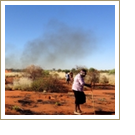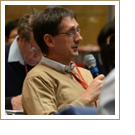 |
View this newsletter in your browser. |  |
| Research Highlights | |
| People Spotlights | |
| Program Updates | |
| In the News |
| Calendar of Upcoming Events | |
| Nov. 14 |
Environmental Forum |
| "The Astounding Simplicity of Tropical Peat Forests" Charles Harvey, Doherty Associate Professor of Civil and Environmental Engineering at MIT » Read more ... |
|
| Nov. 18 |
Energy Seminar |
| "Powering the Future" Robert Laughlin, Physics, Stanford » Read more ... |
|
| Nov. 20 |
Environmental Forum |
| "Bridging the Gulf: Generating and Translating Knowledge of Coupled Human-Ocean Systems" Heather Leslie, Assistant Professor of Environmental Studies and Biology, Ecology and Evolutionary Biology and Center for Environmental Studies, Brown University » Read more ... |
|
| Nov. 21 |
Environmental Forum |
| "New Solutions for Global Control of Parasitic Infections: the Case of Schistosomiasis" Giulio De Leo, Biology, Hopkins Marine Station, Stanford Woods Institute » Read more ... |
|
A New Way to Value NatureAmong the victims of the recent 16-day federal government shutdown: one young couple's wedding dreams. Kathryn Ho and Jeffery Turley had planned to tie the knot amid the grandeur of Yosemite National Park. Because of the park's closure, however, the bride and groom had to make other plans. The couple's story, chronicled by The New York Times, highlights the economic value of natural areas. National park visitors alone generated more than $30 billion in economic activity and supported 252,000 jobs nationwide in 2011, according to a peer-reviewed federal report. In an attempt to learn more about the value of parks and other natural areas, scientists affiliated with the Natural Capital Project are using photo-sharing site Flickr to measure where and when people use specific sites for recreation and tourism. Their findings promise a new way to measure the benefits and value that these places provide to the economy and society as a whole. Read on for more thought-provoking approaches to environmental challenges. Sincerely, |
||
|
Debbie Drake Dunne |
Jeffrey R. Koseff |
Barton H. Thompson, Jr. |

Hunting Practice Has Surprising ResultThe way that Aboriginal people in Australia hunt monitor lizards for food leads to many more of the lizards, rather than fewer, according to a study co-authored by Stanford Woods Institute-affiliated Associate Professor of Anthropology Rebecca Bird and Senior Research Scientist Doug Bird. The hunting method - using fire to clear patches of land to improve the search for game - also creates a mosaic of regrowth that enhances habitat. The findings offer new insight into maintaining animal communities through ecosystem engineering and co-evolution of animals and humans. |

Drones Open Way to New World of Coral ResearchLike undiscovered groves of giant redwoods, centuries-old living corals remain unmapped and unmeasured. Scientists still know relatively little about the world's biggest corals, where they are and how long they have lived. The secret to unlocking these mysteries may lie with a four-rotor, remote-controlled drone outfitted with cameras that can film coral reefs from up to 200 feet in the air. Stanford Woods Institute Senior Fellow Stephen Palumbi (Biology) is helping pioneer the use of drone technology to precisely map, measure and study shallow-water reefs off Ofu Island in American Samoa. |

Red States Support Climate LegislationIt’s easy to assume people in "red" and "blue" states have very different ideologies regarding climate change. An analysis of surveys measuring Americans’ opinions about global warming-related issues tells a different story. Senior Fellow Jon Krosnick (Communication and Political Science) presented the findings to the congressional Bicameral Task Force on Climate Change in Washington, D.C. Among them: Majorities of residents in every state surveyed said the government should limit greenhouse gas emissions by businesses, enact a cap-and-trade system to limit emissions and give tax breaks to encourage the production of renewable energy. |
| For more research, see the Stanford Woods Institute quarterly Research Digest. |

Woods Fellow Bill Durham Reveals Dangers to Darwin's ParadiseIn the Galapagos Islands, an ecological wonderland made famous by Charles Darwin, the tension between conservation and development is particularly acute. Stanford Woods Institute Senior Fellow Bill Durham (Biology) recently led more than 30 students and affiliates of Stanford's Master of Liberal Arts Program on an expedition to explore the Galapagos and the pressures they face. |

Recognizing Climate Science CommunicationNicholas Stern, an eminent economist and outspoken proponent of moving to a low-carbon economy, has been named the winner of the 2013 Stephen Schneider Award for Climate Science Communication. The $10,000 award is named for former Stanford Woods Institute Senior Fellow and renowned climate scientist Stephen Schneider. Stern authored a highly influential 2006 report on the economics of climate change, which concluded that the problem was one of risk management on an immense and unprecedented scale, and that the costs of inaction were far greater than the costs of action. |

Honoring Unsung HeroesThe Bright Award for Environmental Sustainability is a new $100,000 prize to be given annually to an individual who has made significant contributions to the fields of environmental preservation and sustainability. Stanford Law School will be presenting the first award to Tasso Azevedo, an innovative leader in creating sustainable forestry practices in the Amazon. Azevedo is the founder and director of Brazil’s Institute for Agricultural and Forest Management and Certification, and former director of the National Forest Program at the Brazilian Ministry of the Environment. The inaugural award presentation and lecture, co-hosted by the Stanford Woods Institute, will be held Dec. 10 at 4 p.m. in Stanford’s Paul Brest Hall at 555 Salvatierra Walk. A reception will follow. RSVP to brightaward@law.stanford.edu. |

Environmental Venture Projects Accepting ProposalsThe Stanford Woods Institute is now accepting letters of intent (LOIs) from Stanford faculty members for the 2014 Environmental Venture Projects (EVP) program. The program provides seed funding for interdisciplinary research that yields solutions to global environment and sustainability challenges. Woods will consider projects with budgets up to $100,000 per year for up to two years. LOIs will be evaluated for quality, intellectual merit, potential for solving environmental problems and likelihood of attracting ongoing funding. |

Materials by DesignEnvironmentally promising technologies were the focus at the recent fall conference of the Energy and Environment Affiliates Program (EEAP). Attendees learned from Stanford faculty and students about topics ranging from synthetic molecular design for clean energy and renewable materials using plant chemistry to engineered fluids for hydraulic fracturing and optical materials for efficient solar processes. An industry panel discussion with representatives from DuPont Photovoltaic Solutions, Samsung Cheil and Applied Materials, Inc., capped off the conference. |

First Nations' Leaders of Tomorrow"We cry saltwater," said Mark Ellis. "We sweat saltwater. We are ocean people." Ellis, the 12th generation on his family's land in Hawaii, was explaining to other young indigenous leaders from Hawaii, Alaska and New Zealand the deep ties he feels to his homeland’s environment. The 16 program fellows were at the Stanford Woods Institute for the First Nations' Futures Institute, a two-week program that helped prepare them to tackle social, economic, environmental and cultural challenges in their communities. |

New Online Home for Global Freshwater InitiativeIn many parts of the world, vital freshwater faces severe threats. The Global Freshwater Initiative (GFI), a research program of the Stanford Woods Institute, has a new tool in its pursuit of solutions to these challenges. The program's newly designed website - globalfreshwater.stanford.edu - mirrors the Woods website's clean design, large display images, intuitive navigation and content organized by research areas. By leveraging a mix of tools, including multimedia and publications directories, this platform provides a powerful vehicle for engaging and informing a wide audience ranging from the public to policymakers. GFI is an interdisciplinary program that develops strategies to promote the long-term viability of freshwater supplies for people and ecosystems threatened by climate change, shifts in land use, increasing population, decaying infrastructure and groundwater overpumping. |
| Selected media coverage of the Stanford Woods Institute and its fellows, affiliated scholars and supported research |
Who Is Conservation For?The Chronicle of Higher Education, Nov. 10 |
Tiny Drone Aircraft Yielding Detailed Maps of Coral Reef EcosystemsUPI.com, Oct. 17 |
Water Trial Opens; Wyoming Claims Waste by MontanaAssociated Press (via Billings Gazette), Oct. 16 |
Options Sought in Oakdale to Avert Water CrisisModesto Bee, Oct. 11 |
For Researchers, IPCC Leaves a Deep ImpressionScience, Oct. 4 |
Area Scientists Win MacArthur GrantsSan Francisco Chronicle, Sept. 25 |
Warming Planet Could Spawn Bigger, Badder ThunderstormsNBC News, Sept. 23 |
Scientists Redefine "Clean" Energy by Generating Electricity From SewageSalon, Sept. 17 |
| Find Us on the Web |
|
Read more News and Media Coverage from the Stanford Woods Institute's fellows and affiliated faculty, including fellows with our Leopold Leadership Program. Submissions Past issues can be found online. For more information about the Stanford Woods Institute, visit our website, or email us at environment@stanford.edu. |